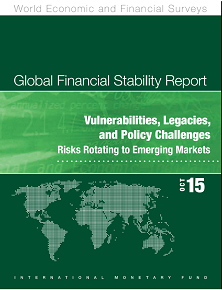Hüttl, Pia, Wilson, Karen, Wolff, Guntram, (2015), “The Growing Intergenerational Divide in Europe”, Bruegel Publications, Issue 17, November. During seven years of economic crisis, the intergenerational income and wealth divide has increased in many European Union countries. In the bloc as a whole, young people on average have become significantly poorer, while poverty among pensioners has been reduced (Figure 1). Unemployment among the under-25s has risen notably while older workers (aged 5-64) have been less …Read More
The macroeconomic effects of the Eurozone’s fiscal consolidation
Rannenberg, Ansgar, Schoder, Christian, Strasky, Jan, (2015), “The macroeconomic effects of the Eurozone’s fiscal consolidation”, Voxeu, 11 November. From 2011 to 2013, fiscal policy in the Eurozone turned progressively more restrictive. This column argues that output cost of fiscal consolidation strongly depends on presence and strength of credit constraints. With credit constraints both in the household and the firm sector, fiscal consolidation would be largely responsible for the weak growth performance during 2011-2013. …Read More
Global Financial Stability Report-October 2015
International Monetary Fund, (2015), “Global Financial Stability Report October 2015 – Vulnerabilities, Legacies, and Policy Challenges Risks Rotating to Emerging Markets”, World Economic and Financial Surveys, October. During the past six months financial stability has improved in advanced economies, but risks continue to rotate toward emerging markets amid a lower risk appetite and higher market and liquidity risks. In advanced economies, growth is gaining traction, and monetary policy normalization is approaching in …Read More
Short-sighted monetary policy and fear of liftoff
Orphanides, Athanasios, (2015), “Short-sighted monetary policy and fear of liftoff”, Voxeu, 11 November. There is generally consensus among macroeconomists that monetary policy works best when it is systematic. Following the financial crisis, the Federal Reserve Bank of the US shifted from long-term, systematic policy to short-term goals targeting unemployment. This column argues that, while these were appropriate in the aftermath of the downturn, such policy accommodations have been pursued for too long …Read More
External imbalances within the Eurozone: The Dutch disease explanation
Sy, Mouhamadou, (2015), “External imbalances within the Eurozone: The Dutch disease explanation”, Voxeu, 9 November One of the most prominent features of the Eurozone Crisis has been the large current account deficit accumulated by countries at the periphery relative to those at the core (Baldwin and Giavazzi 2015). These imbalances (see Figure 1) are commonly attributed to differences in competitiveness as manifested in persistent differences in the unit labour costs, or …Read More
Has the crisis affected the behavior of the rating agencies?-Panel Evidence from the Eurozone
Boumparis, Periklis, Milas, Costas, Panagiotidis, Theodore, (2015), “Has the crisis affected the behavior of the rating agencies?-Panel Evidence from the Eurozone”, University of Macedonia, Discussion Paper No. 4/2015, November We examine the determinants of credit ratings for the Eurozone countries over the period 2002-2013 within a panel framework that allows for cross-sectional dependence. We find that government debt and the cumulative current account exert a stronger impact on ratings post- 2008 compared to …Read More
Labour Market Regulation, Fiscal Consolidation, and the Success of Current Account Adjustments
Adam, Antonis, Hatzipanayotou, Panos, Moutos, Thomas, (2015), “Labour Market Regulation, Fiscal Consolidation, and the Success of Current Account Adjustments”, AUEB Working Paper Series 15-17, October In this paper we argue that the strictness of labour market regulations can interact with the mode of fiscal consolidation (tax- based versus spending-based fiscal adjustments) to affect whether current account adjustments are successful. Using data from 81 countries, we are able to identify 147 episodes …Read More
Eurozone crisis: Looking back to the future
Kaminsky, Graciela L., (2015), “Eurozone crisis: Looking back to the future”, Voxeu, 8 November The Eurozone crisis is still lingering. While in the last couple of months only Greece’s debt woes have been at the centre of public attention, vulnerabilities across countries in the Eurozone are not fading away. Europe is still mired in a long depression, and debt problems are still escalating. While it is true that Ireland, Portugal, and …Read More
Inflation and Activity – Two Explorations and their Monetary Policy Implications
Blanchard, Olivier, Cerutti, Eugenio, Summers, Lawrence, (2015), “Inflation and Activity – Two Explorations and their Monetary Policy Implications”, IMF Working Paper, WP/15/230, November We explore two issues triggered by the crisis. First, in most advanced countries, output remains far below the pre-recession trend, suggesting hysteresis. Second, while inflation has decreased, it has decreased less than anticipated, suggesting a breakdown of the relation between inflation and activity. To examine the first, we look at 122 recessions over the past 50 …Read More
The Eurozone: Deflationary Boom Or Deflationary Bust?
Weeks, John, (2015), “The Eurozone: Deflationary Boom Or Deflationary Bust?”, Social Europe Journal, 6 November. Several years ago the idea that fiscal austerity could induce growth, “expansionary austerity”, had a brief flowering before withering under the heat of ridicule. Recently it resurfaced under a different name, “deflationary boom”. If expansionary austerity was oxymoronic, deflationary boom is simply moronic. Relevant Posts Weeks, John, (2015), “Euro Deflation And How To Interpret It”, Social Europe …Read More





